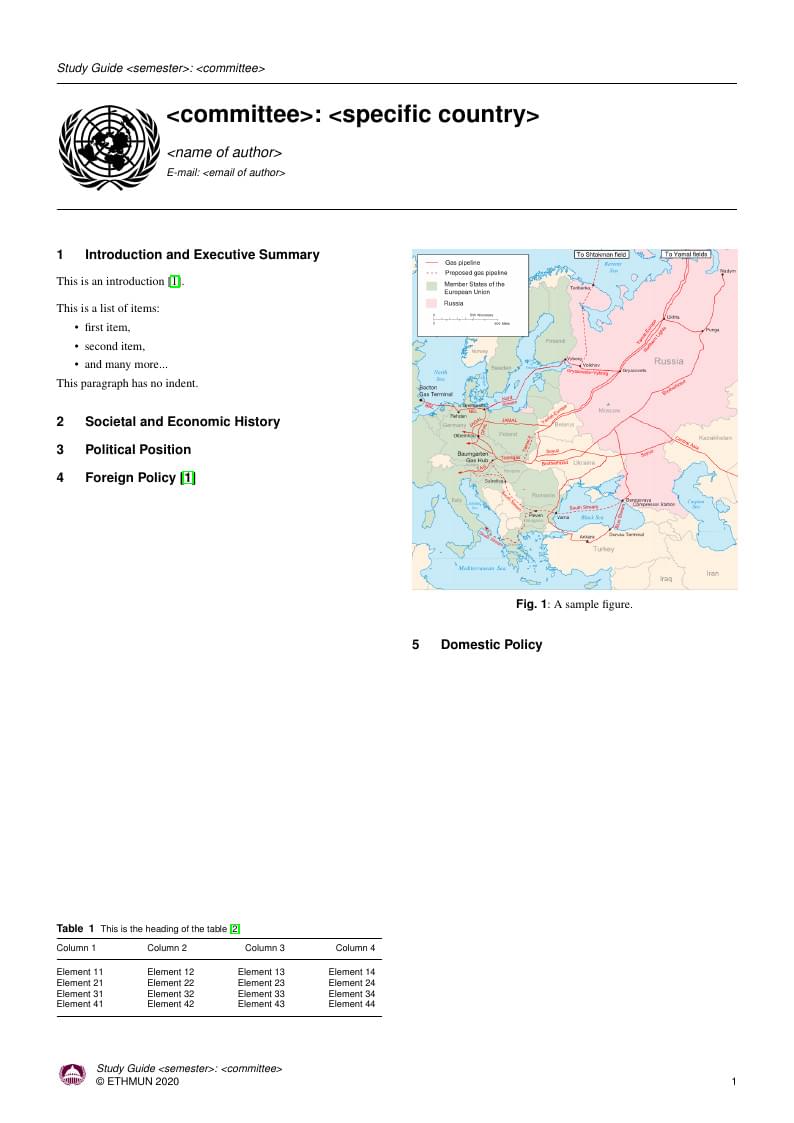
ETHMUN Study Guide v1.1
Author:
Ferdinand Baune
Last Updated:
6 anni fa
License:
Creative Commons CC BY 4.0
Abstract:
Moden UN Study Guide Template for ETHMUN.

\begin
Discover why over 25 million people worldwide trust Overleaf with their work.
Moden UN Study Guide Template for ETHMUN.

\begin
Discover why over 25 million people worldwide trust Overleaf with their work.
\documentclass{guide-ethmun}
\usepackage[ampersand]{easylist}
\usepackage{helvet}
\usepackage{marvosym}
\usepackage{hyperref}
\usepackage{dashrule}
\usepackage{pdfpages}
\usepackage{marvosym}
\usepackage{textcomp}
\newcommand{\quelle}[1]{\textit{\href{#1}{#1}}} % Hyperlink for sources, see References
\newcommand{\eur}[1]{\EUR\,#1\,bln.} % € #1 bln.
\newcommand{\eurm}[1]{\EUR\,#1\,mln.} % € #1 mln.
\newcommand{\usd}[1]{\textdollar\,#1\,bln.} % $ #1 bln.
\newcommand{\usdm}[1]{\textdollar\,#1\,mln.} % $ #1 mln.
\begin{document}
%%%%%%%%%%%%%%%%%%%%%%%%%%%%%%%%%%%%%%%%%%%%%%%%%%%%%%%%%%%%%%%%%%%
% Fill in Title Info here:
\supertitle{Study Guide <semester>: <committee>}
\title{<committee>: <specific country>}
\author{\au{<name of author>}}
\address{\email{<email of author>}}
\date{logo-un.png} % File name of the Committee logo ("logo-un.png" for default UN logo, "ethmun-logo.png" for default ETHMUN logo)
\CYear{2020} % Adjust the correct Year
%%%%%%%%%%%%%%%%%%%%%%%%%%%%%%%%%%%%%%%%%%%%%%%%%%%%%%%%%%%%%%%%%%%
% \begin{abstract}
% We don't do abstracts at the moment.
% \end{abstract}
\maketitle
%%%%%%%%%%%%%%%%%%%%%%%%%%%%%%%%%%%%%%%%%%%%%%%%%%%%%%%%%%%%%%%%%%%
% Writing starts here:
\section{Introduction and Executive Summary}\label{sec:summary}
This is an introduction \cite{ref:consilium}.
\newline
\noindent This is a list of items:
\vspace{0.5em}
\begin{easylist}[itemize]
& first item,
& second item,
& and many more...
\end{easylist}
\vspace{0.5em}
\noindent This paragraph has no indent.
\section{Societal and Economic History}
\begin{table}[b]
\processtable{This is the heading of the table \cite{ref:table} \label{tab:table}}
{\begin{tabular*}{20pc}{@{\extracolsep{\fill}}llrr@{}}\toprule
Column 1 & Column 2 & Column 3 & Column 4\\
\midrule
Element 11 & Element 12 & Element 13 & Element 14\\
Element 21 & Element 22 & Element 23 & Element 24\\
Element 31 & Element 32 & Element 33 & Element 34\\
Element 41 & Element 42 & Element 43 & Element 44\\
\botrule
\end{tabular*}}{}
\end{table}
\section{Political Position}
\section{Foreign Policy \cite{ref:consilium}}
\newpage
\section{Domestic Policy}
\begin{figure}[!t]
\centering{\includegraphics[width=\columnwidth]{sample_map.png}}
\caption{A sample figure.}\label{fig:pipelines}
\end{figure}
\newpage
\section{Recent Developments}\label{recent}
%\begin{figure}[!t]
%\centering{\includegraphics{sample_1.eps}}
%\caption{Sample graph with blue (dotted), green (solid) and red (dashed) lines
%\figfooter{a}{Subfigure 1}
%\figfooter{b}{Subfigure 2}\label{fig1}}
%\end{figure}
%\begin{figure*}[!b]
%\centering{\includegraphics{sample_2.eps}}
%\caption{Sample graph spanning two columns\label{fig2}}
%\end{figure*}
%%%%%%%%%%%%%%%%%%%%%%%%%%%%%%%%%%%%%%%%%%%%%%%%%%%%%%%%%%%%%%%%%%%
% References start here:
% \vfill\pagebreak
\begin{thebibliography}{\hspace{1cm}}
\bibitem{ref:consilium}
European Council: 'Website of the European Council' \\
\quelle{https://www.consilium.europa.eu/en/}
\newline
\bibitem{ref:table}
<Author>: 'Title of the Reference' \\
\quelle{https://www.link-to-the-source.com/whatever/something/table}
\end{thebibliography}
\end{document}